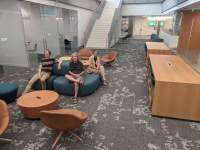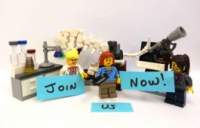Programme for 2023
• Due to unavailability of our venue and family commitments of our organising team we currently are uncertain if there will be any further events this year.
Watch this space for updates.
• Wednesday 8th February – Dr Richard Taylor (University of Oregon) ‘Fractal fluency: Using fractal designs to promote health and performance’
13th February Update
Hi everyone,
Unfortunately, due to weather we have had to postpone tomorrow night’s talk with Dr Edgar Burns on ‘Regenerative Agriculture and Creating New Zealand’s Future’.
We will update you when we are able to confirm a new date with Edgar.
Stay safe out there,
Laura Raymond (PhD)
Branch President
The Rotorua Branch of the Royal Society Te Apārangi
8th February 2023 talk
Fractal fluency: Using fractal designs to promote health and performance
Dr Richard Taylor
Universiry of Oregon
ROTORUA |Wednesday 8th February, 6.00 pm.
Rimu Room, Scion (new Scion entrance,
Entry from Tītokorangi Drive (Long Mile Rd)
Doors open 5.45 pm. Please be there promptly before 6.00 pm.
Free entry. All welcome.
Co-hosted with the MacDiarmid Institute

Dramatically referred to as ‘the fingerprint of life’, fractals have been shown to be the basic building block of many of nature’s patterns, ranging from clouds, trees and mountains through to our brains, blood vessels and lungs. Perhaps the most staggering factor in the story of fractals is that artists have been capturing these patterns in their artworks long before these recent scientific breakthroughs. Examples include Leonardo da Vinci’s drawings of turbulent rivers, Jackson Pollock’s epic organic paintings and M.C. Escher’s mind-bending prints. The growing impact of fractals on cultures around the world and their prevalence in nature raises a simple and yet crucial question – does exposure to fractal patterns have a positive impact on the observer? Using sophisticated techniques such as eye-tracking and brain mapping, Professor Taylor and collaborators are investigating fractal fluency – the idea that, through exposure to nature’s fractals, the eye has evolved to process these patterns with relative ease, triggering an aesthetic experience accompanied by reductions in stress and mental fatigue. Given the long list of stress-related illnesses (stress can impact schizophrenia, depression, blood pressure, hormonal imbalances, and even bone density), incorporation of fractals into our daily living and workspaces could have a huge impact on society. This talk will review the facts behind fractal fluency and present applications such as fractal solar panels and window shades, along with ceiling and flooring patterns.
Physicist Richard Taylor is internationally known for his innovation using bioinspiration to improve health and wellbeing. He has published more than 300 papers, including 11 papers Nature and 3 in Science. Find out more here https://blogs.uoregon.edu/richardtaylor/
POSTPONED
Regenerative Agriculture and Creating New Zealand’s
Future
Dr Edgar Burns
University of Waikato
ROTORUA |POSTPONED, 6 pm.
Rimu Room, Scion (new Scion entrance,
Entry from Tītokorangi Drive (Long Mile Rd)
Doors open 5.45 pm. Please be there promptly before 6.00 pm.
Free entry for members – please sign in at the door.
$5 donation for non-members – please pay at the door.
All welcome.

Rural NZ media has been talking a lot about Regenerative Agriculture over the past 2-3 years. What does it offer? Is it compatible with conventional farming? Can you be a bit regenerative? The big international food corporates like McCains and General Mills are increasingly sourcing supplies from regeneratively farmed properties. This alerts us to the shifting environmental economics of rural food and fibre. This presentation traverses some of the shifting drivers of modern farming, food supply chains and environmental consequences of today’s land use heading into a hotter world.
Dr Edgar Burns grew up on a mixed farm near Hastings. He has degrees in psychology,sociology, and business. For some years he owned and operated a rural plant nursery. He recently come back from more than a decade at La Trobe University, Melbourne. His present role as Chair of Integrated Catchment Management is funded jointly by the University of Waikato and the Hawke’s Bay Regional Council. The aim is to encourage new perspectives on the environment and climate change. He teaches papers on the geography and sociology of the environment. He is a member of the MBIE Technical advisory Group on Regenerative Agriculture.
Membership for 2023 is now due.

We are relying on member subscription to support the cost of bringing top New Zealand and international speakers to Rotorua. The more members we have, the more events and speakers we can afford to host. Membership is only $20 per year for individuals or families.
A membership form is available on our website. Please make sure to your email address is clear so we can send you information. You can pay by cash at our meetings or by electronic banking.
Our bank account details are as follows:
Westpac – Royal Society of NZ Rotorua 03 1552 0093123 00
Please make sure your name is clearly shown in the reference box when setting up the payment.
Past Events
2022
• Tame Malcom - Mātauranga for protecting our taonga
• Alec Foster - Biotechnology and the Materials for the Future
• Anne Jaquiery - Neonatal and paediatric nutrition
• Dr Shalini Divya - MacDiarmid Institute Regional Lecture Series
• Paul Kilmartin - Sauvignon blancs that pack a punch’
• Marcus Vandergoes and Susie Wood - Searching for answers in the mud – unearthing the history of lakes in Aotearoa Zealand
• Ben Manley - Tītokorangi: Prop up the Heavens
2021
• Douglas Gaunt - Structural aspects of Te Whare Nui o Tuteata
• Brad Scott - The geological history and hazards of the Rotorua District
• Hannah Blumhardt and Liam Prince (The Rubbish Trip) - Living without a rubbish bin – the world of zero waste Co-sponsored with Envirohub's Sustainable Backyard programme
• Gretel Ingrid Boswijk - Talking tree rings: recent dendrochronology research in New Zealand
• Anthony Poole - DNA - what is it, where did it come from, and will it replace your hard drive
• Neil Gemmell - The tuatara genome - new insights into a venerable survivor
• Cynric Temple-Camp - Reflections on a Potpourri of Deaths. The imprecision of Knowledge.
• Shirley Kerr - Fungi Fetish
• Rest of program - postposed untill 2022
2020
• John Petrie - Rheumatology in Rotorua: An unpopular & unscientific Medical Specialty standing at the Gates of Hell
• Brian Patrick - Natures rainbow - Discovering New Zealand’s amazing butterflies
• Manu Caddie - Cannabis, Social Enterprise & Sustainable Development
• Siân Halcrow - Modelling
social and environmental change in prehistory: Using infants and children
• Micah Scholer - The slow pace of life in tropical birds
• Allan Blackman - Chemistry Matters
• Marc Gaugler - New Zealand’s new plastics economy roadmap
2019
• Philip Hulme - Ornamental to detrimental: The invasion of New Zealand by non-native plants
• Boyd Swinburn - Sustainable diet
• Wendy Larner - Royal society address
• Maurice Curtis - Neurodegenerative diseases
• Rangi Matamua - Ko Matariki e ārau ana - The gathering of Matariki
• Clint Cameron - Restoring aquaculture ponds back to mangroves
• Movie - ‘First Man’ for the Apollo anniversary
• Margaret Brimble - Life as a Medicinal Chemist
• Andrew Allan - New breeding technologies for NZ’s Plant Sector
• Sandra Velarde - Homeward Bound (Antarctica expedition inspiring women in science)
• Documentary - The 21st Century Race for Space